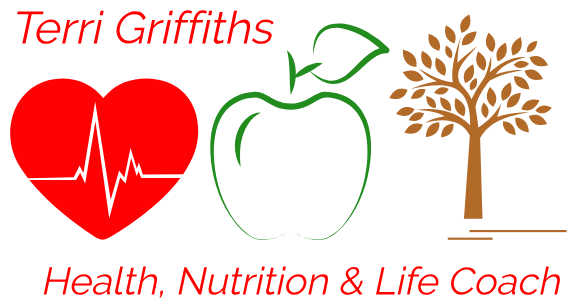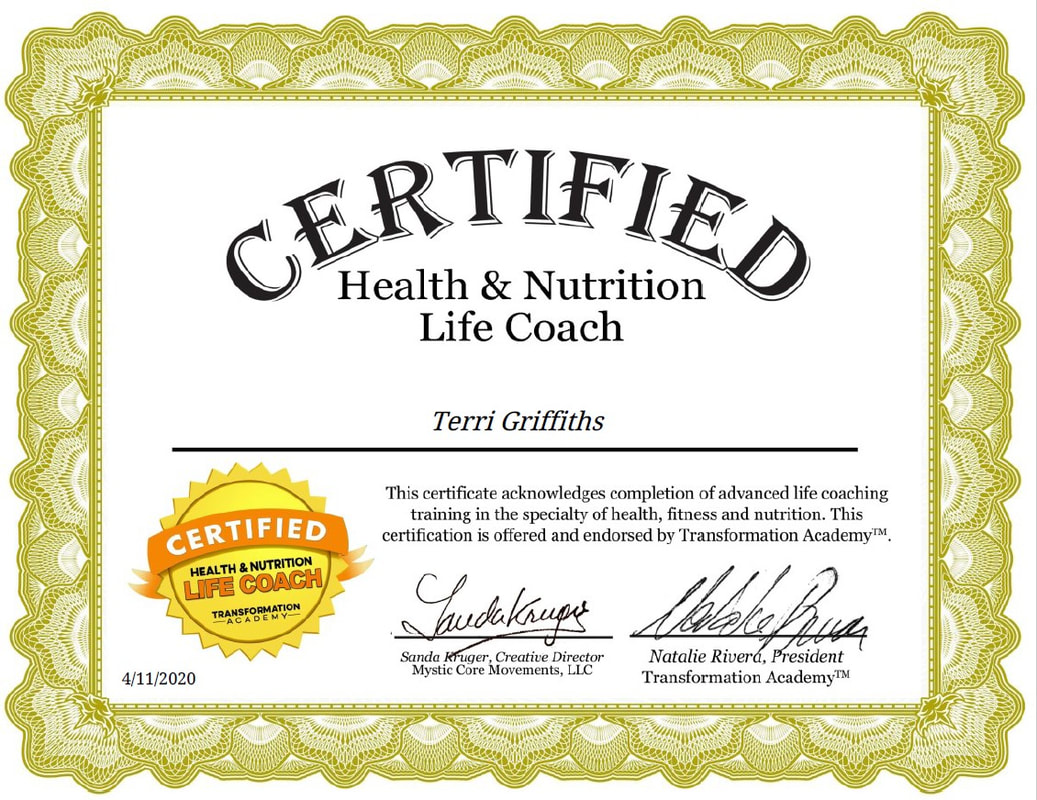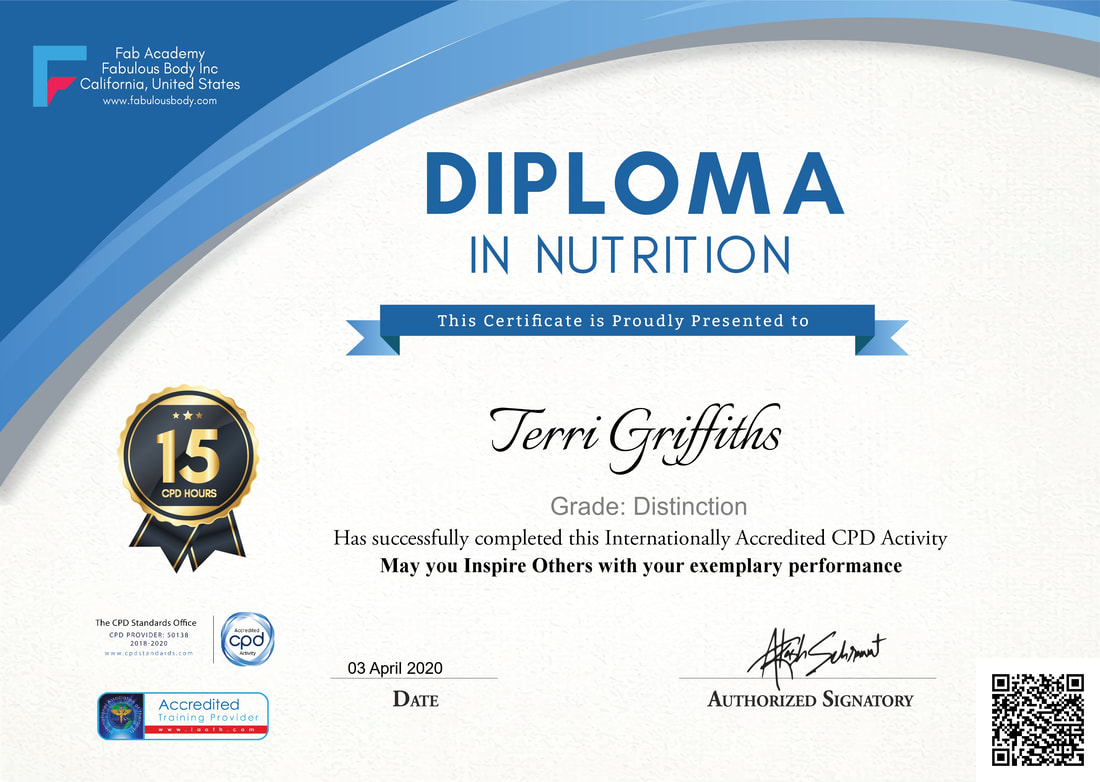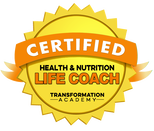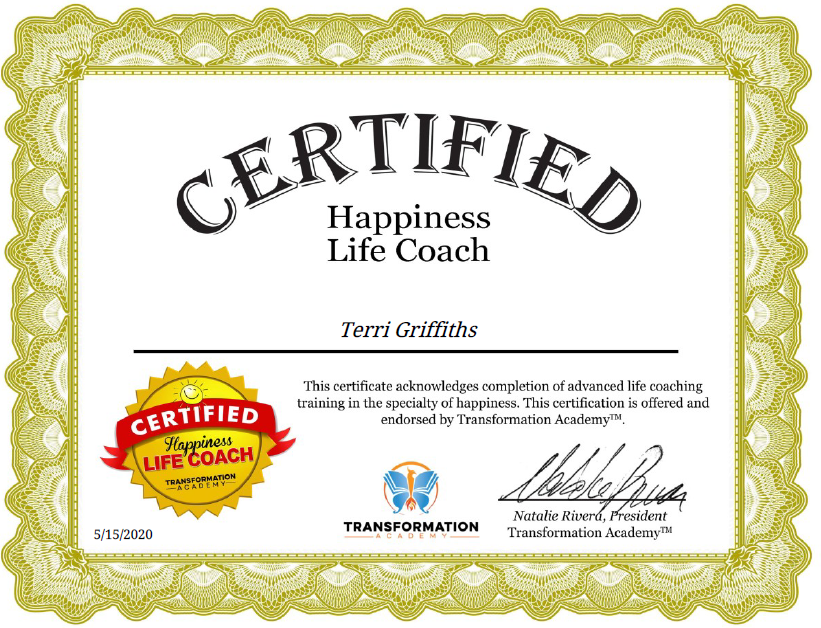What are you eating...when do you eat?I have had a lot of people asking me this question. I always eat healthy, that's my choice. And I always prep my food. That's my lifestyle. I like always having good food to hand, so I don't get drawn into temptation, as I would like everyone does. But I know if I have my home made healthy food available when I'm hungry, then that's what I will eat. I am eating around 1500 - 1800 calories a day, depending on activity, on a low carb paleo style diet, as I do think that the key to fat burning is to keep glycogen stores low to empty (when fasted) to force the use of fuel from ketones. Remember, when fueled by ketones, you are burning fat. If I kept eating 50% carbs a day in macros, my glycogen stores will be full to the brim all the time, making it harder and taking them longer to get emptied during each fast. And remember, the body will always live of these first. So keeping carbs low = lowers insulin levels which lowers glycogen stores = faster glycogen depletion on a fast = more time fuelled by ketones = more time fat burning. I do want to add to this, carbs are not the enemy. They are not bad for you. Particularly complex carbs. Potatoes, rice/grains etc. But when dieting keeping them low helps to burn fat. When I go back to maintaining my weight and have reached my body fat goal, I will introduce these carbs back into my diet, as I will then be happy for my body to be fuelled by glycogen. Because I will no longer need to be in ketosis state of fat burning. And will maintain a varied lifestyle diet including a selection of good complex carbs. I currently eat 5 days a week. Prepping my low carb meals for 4 days, and making a tasty and delicious treat meal for the 5th day. I find planning the dish makes me look forward to the weekend treat day, and then cooking this special meal helps me through the week, and I also prepare the meal during my fast on Saturdays knowing I can eat it at 6pm when my fast finishes. It may sound like torture to some, but I find I thoroughly enjoy the preparing of the meal more and when the end of fast time comes, and have a delicious freshly made nutritionally rich meal to eat and enjoy. So, what do I eat?..... 6am - Breakfast I do like a veggie / fruity shake. And I do find them filling. In my nutribullet I throw in - Half an avocado A small beetroot Blueberries Small Banana Handful of kale Few leaves of mint 100g Coconut Soy yoghurt Water to fill mark Teaspoon of Xylitol (Natural sweetener for my sweet tooth) Whizz it up and hey-presto! A lush veggie/fruity shake. I buy the kale and mint fresh and freeze them so they last longer. The blueberries I buy frozen, and the rest is fresh. This all equates to about 300 calories of healthy lushness. 9am - Meal 2 - While I sit in the car outside the days job or where ever I have found to sit for 5 minutes before I start work, I eat my next meal. My omelette I prefer to eat cold. Don't knock it till you try it!! This is my favorite omelette right now! To make the omelette I use - 2 egg omelette Dash Almond milk dash Water Seasoning Once the omelette is cooked, add to the topping - 50g Apertina Cheese cubed Basil leaves Sun Dried Tomatoes in oil Don't cook these. I have found you lose the flavor if they are cooked. Then fold it and allow it to cool before storing it in the fridge. I make up to 2/3 of these in advance, ready to take with me to work. Then I eat them like a sandwich wherever I land. This is well worth a try. 1pm and 5pm Meals 3 and 4 - These I prep all on a Sunday. 4 chicken meals, and 4 mackerel meals ready for the week. I do eat the same thing most days. It's a habit I have from years of prepping. A little bit of laziness I guess as it makes life easier! I don't have to think too much about what I want to eat, I know exactly my daily macros are correct, and I can shop for exactly what I need, with very little waste. My fridge is always empty at the end of a week, as I shop to order, and eat all I buy. Below is Saturday morning after a shop, Sunday after a prep and Friday evening when it's all gone! I throw away each week one recyclable bag of rubbish, and a quarter of a black bag. Doing my bit for the environment too. Every now and then I might get bored of the same menu. I change it. Normally make a point of changing all five meals totally. And then live off those for however long. So, my chicken and mackerel meals are pretty simple - I roast 4 broccolis and 3 leeks in the oven for 15 mins, sprinkled with himalayan salt and smoked paprika, and cooked with a little bit of coconut oil. I grill 4 lots of chicken (normally between 200-250 g) and buy fresh smoked mackerel . My food prepping for the week...takes my 30 minutes. Then I box them and let them cool, before putting them in the fridge. Because the veg is roasted and still quite firm, They last well. And I never tire of eating these as they are so tasty. 8pm - Meal 5 - This is the meal everyone generally yucks at! I love it. And have eaten it ...for years! Through competition prep too! For some reason, I just love the taste. A medley of cabbage, salt and peppered...and boneless sardines in olive oil. I probably keep John West in business with how many tins I've bought over the years! Don't knock it, till you've tried it! Lol! So thats my daily food. I do give in sometimes to weekday treats. I couldn't resist a Mrs Crimbles chocolate coconut macaroon with a coconut latte at a David Lloyds gym I was at recently! And enjoyed every bite. And often have these little treats once a week outside of my main treat day. So then, what do I have on a treat day? Treat Day! - I spend the week deciding on what I want to, and finding recipes that tickles my fancy. I bought a new combined slow cooker / pressure cooker, so wanted to play with it. So these were taken from Heston Blumenthals recipes. First I made a Beetroot, Quinoa and Feta salad.....
I pressure cooked the fresh beetroot for 15mins, and chilled them. The pressure cooked the quinoa for 5 minutes (1 cup uncooked quinoa makes 3 cups of cooked)
Then I prepared a lemon and herb whole roast chicken. Can't get better, than a slow cooked chicken!
I also had enough to make into 5 meals, which I fed 2 friends, and had 2 prepped meals the following day for my little Sunday trip out to watch UK's Strongest Mans Finals in St Albans. Bonus. So there is an example of my weeks fodder! I will be including just my weekly treat recipes that I have on the evening after I finish my fast. But what about the fasting?I have found it so easy to fast for 24 hrs. I really don't see why anyone can't do it. I am a hardcore dieter though remember. I have been on a diet every year for the last 6 years for 20 - 30 weeks of each year. That being the initial weight loss diet into a competition qualifier, then the continued diet to finals and other shows that year, This the total diet time of this process each year. I have deprived myself of favorite foods for months on end, all for the sake of competitive bodybuilding. I generally find starting these diets fine, but slowly after weeks pass by, you do become food and craving obsessed. I have browsed pages of pictures of cakes and huge burgers during diets, planning that feast after that last show like I think all of us do. Dreaming of piles of you favorite foods, and counting the weeks and days till I can eat them. Coming out of these long extreme diets isn't easy either. Mentally, it's much harder to recover sometimes than physically, although it can really take its toll physically too. It can take 2 - 3 months to get your head thinking normally about food again. And in this time it is common to have massive binges as you tell yourself it's OK, you are allowed to eat whatever you like as sort of reward for all those weeks of putting yourself through that hardcore diet. Although, really I shouldn't be eating the volumes I do during this time. Which is also why I can so quickly gain weight (which is often needed) but often too much weight from lots of over eating when recovering from a bodybuilding competition diet. This can also be the same experience for people on the usual weight loss diets. Weeks of a low calorie restricted diet, leave you craving foods and volume of foods. Often craving fullness, over specific food. Resulting in....over eating when it's over, which means the weight goes back on. And so the cycle continues. Also your metabolism slows after long periods of lowered calories on a diet. I've mentioned BMR before, this being Basal Metaphoric Rate, this is the calculation that works out how many calories you as an individual needs for you body to function when you do nothing for a day. So how many calories your brain, heart, kidneys etc need to function properly to do there job, this remember includes no activity, purely just to function. Here's one (of a few) reasons why your metabolism appears to slow after a diet -
This is one reason why diets often fail, and weight creeps back up as you should be eating less that you are used to the other end, due to the change in your size and frame. So why has fasting proven to be a continual success after you reach your goal weight? So remember I mentioned the 382 day longest fast? And that he continued to maintain his weight loss after that long diet. And results are showing again and again that the weight loss stays consistent. And he always claimed he simply didn't feel hungry. I do think it's something to do with you having a better understanding of balancing your food intake (Feast and famine). And know that it is not the end of the world if you skip a meal or two. And hunger does not progressively get worse and and worse until you can't take the pain anymore, that simply does not happen. And when you put yourself through a fasting diet you realise this. You seem to control your hunger better, feel less hungry, and less controlled by food. Why do you feel less hunger? There are lots of reports of people saying they feel less hungry when fasting. I think this is because of a number of reasons. I do believe you become more in charge of your temptations mentally. But also the is physiological reasons too. -
So, back to my fasting ... So, why the hell was I worried about not eating for 24 hours, when I have done such extreme diets as mentioned earlier? Still in these early days I feel a ounce of concern just as I finish the last meal before the fast, and then I always wonder why once its over. I wake up the day of the fast, knowing I will eat at 6pm that day. Which considering the long diets and workout regime I've been on before, this is no hardship! So I am finding each fast gets easier. And I sometimes look forward to it, as I'm seeing regular and consistent fat loss too. Which is a huge motivation. I'm not having massive cravings for food at all. If I fancy something, I eat it on my treat day. At the theatre this week I shared munchies and starbursts with my goddaughter, with no guilt, after eating a bloody lovely salmon thai red curry I made with peshwari naan. (Details of this will come later) So being that I am able to eat what I fancy once a week too, I don't seem to have cravings. The fasting is breaking my hunger habit too of wanting food every 3-4 hours. I find when I am on eating days, I often miss the time for eating as I seem to feel less hungry. Or it simply doesn't bother me that I didn't eat at that 12pm marker. If it passes, so what. I actually feel like I'm eating a lot of food on these days. And seem to enjoy what I do eat more too, but I also fill up quicker. Breaking the eating time routine, stops the hunger signals that tell me it's time to eat. I am also always mentally aware of wanting to keep my glycogen levels low, which subconsciously keeps me eating smaller amounts of low carb meals, even on my treat days. As I don't want them to fill up or spill over. Filling up means I'll go back to being fuelled by glycogen, which means I'm no longer burning fat (ketones). And spilling over if I ate a huge feast would mean those extra calories will be stored as fat, and I'm un-doing my good work done already. So this is why I think it seems to continue to work after the initial diet and weight loss. You understand the process of gaining and losing body fat more, you change your routine to stop the habits of hunger that you felt before, and can live a life of feast the famine to balance out those times when we sometimes eat more, such as weddings and family meals. Now I can hear you all saying out there when I post my treat day meals 'that ain't no treat, it's a small portion and too healthy!' I could go and have a McDonalds and ice cream for my treat meal, but I don't like takeaway junk food. That's just me. I do like biscuits, chocolate and cakes, and I'll dabble in these, but still in minimal amounts, so not to go over my glycogen storage. While doing intermittent fasting, I don't feel the need to gorge myself. Gluttony shouldn't be acceptable for common place for you. Massive portions are never a good thing. Food for thought... Information published in 2018 (read in detail here) shows 26% of adults in England are currently obese. A further 35% are overweight but not obese. And I keep hearing it's because of a carb rich diet, too many sugars in foods, too many fats in foods...bla bla bla bla. Lot's of medical reasons such as thyroids, slow metabolisms, allergies, intolerances etc. Some of these medical reason are proven to be valid of course. But I do truly believe that mostly it's because we eat too much, and are not often aware of what we eat or how much. That's my opinion. We are a nation of bingers from what I see everywhere I go. I've binged, I've seen friends binge and family. Wedding buffets, All you can Eats, Pizzas, huge piles of carveries. We have all done it. There is a distinct lack of knowledge about food, food volumes and nutrition that means a lot of people are in denial or refuses to believe they eat too much, or simply don't care about what they eat. It could be those huge meals out, or a steady small amount of too many nibbles and snacks every day over time, not realising how many calories you are actually eating or how much weight you are gaining. We all need to take responsibility for our own diet, and to stop blaming food packaging, carbs, gluten, sugar and whatever else we can point a finger at. Be responsible for controlling the temptation and resisting that huge packet of 'sharers' crisps or double Mars Bar (or both!) in the petrol station queue. We all often see huge amounts of food eaten in one sitting by people all around us. It is commonplace. Our lack of knowledge or lack of caring has driven illnesses like Alzheimer's, Type 2 Diabetes, heart disease, high blood pressure, cancers and arthritis up into new heights. So it's not just about weight, it's also about health. For more statistics, read here. And there will be more information on how fasting can help with all these later in the blogs. I do also really hope for the day when food, diet, nutrition and healthy life practices are included in nations school curriculum. But that's a whole other blog! Maybe one day.... I don't ever want to feel that craving to gorge myself again if I can help it. This is often caused by deprivation... and emotions, those hormonal imbalances have also got a lot to answer for. Highs and lows can make you gorge too. But eating consistent nutritionally valuable foods, high in those hormone friendly good fats help keep hormones balanced also. Another good reason to keep it your food days healthy. Here's something to think about when considering over eating on a treat day or meal out - First I am going to work out my own BMR (Basal Metabolic Rate) using this link BMR Calculator here. Remember, this tells you what my rested calories are. Mine as calculated today is 1401 calories. To determine my total daily calorie needs, I multiply my BMR by the appropriate activity factor as follows: So mine would be 1401 x 1.55 = 2171 calories a day is what I should eat on an active day, and 1401 is what I should eat if I did nothing. So let's work on an average of these, 1401 + 2172 = 3572 / 2 = 1786. So the average is 1786 calories a day. This is how many calories on average a 46 year old woman of my height and activity level should eat a day. How easy is it to eat more than this each day, or in one sitting? Also notice, it is not the 2000 calorie recommended calories for woman. If you live by that rule, this could be a reason for gaining those few pounds over time too. Also, bear in mind your glycogen storage is rarely empty, so it would often take less than these amount of calories to fill them up, or even over spill them. Causing fats to be stored in your body. **Remember - Glycogen is your brain and bodies preferred fuel source which it gets from the food you eat, mostly from carbs, and proteins. While your body has a filled glycogen store, it does not burn fat as fuel, as it doesnt need to. When it runs low or empty, it start to live off the excess fat cells which turn to ketones, the second favorite fuel source for the brain and body. So high ketone levels means you are burning fat for fuel. Therefore, keeping glycogen levels low as possible promotes fat burning when you are dieting for weight loss. It is also best to split these calories into small manageable meals. Your body can only efficiently digest so many calories at a time. If you eat them all at once, calories may still also be stored as fat, even if it is your suggested BMR, as your digestive system struggles to work it's way though one large meal. My 1786 calories split into my 5 meals work out at about 357 calories a meal. All digested efficiently by my body in manageable amounts of healthy foods. I would eat a balance of food to maintain my weight, keeping carbs to maybe 2 - 3 meals of the 5, so limiting the daily insulin spikes. This is my normal daily diet, not a weight loss diet. Easy. Right? So just how easy is it to overeat in just one meal? Look at these examples - A pop to your favorite coffee shop for lunch - Large Caramel Latte - 331 cals Tuna Melt Panini - 483 cals Salted Caramel Muffin - 491 cals TOTAL - 1305 cals That dessert shop in town Banana and Nutella Waffle - 1020 cals Large Pepsi - 181 cals TOTAL - 1201 Cals Night out with the lads - 8 pints of lager - 1544 cals Donor Kebab - 1990 cals TOTAL - 3534 cals Or with the girls! - 8 small glasses of white wine - 656 cals Donor Kebab - 1990 cals TOTAL - 2646 cals An Indian Takeaway - Korma Tray - 600 cals Pilau Rice Tray - 436 cals Peshwari Naan - 382 cals 1 popadom - 49 cals Portion of indian mint chutney - 121 cals Glass of white wine - 85 cals TOTAL - 1673 Cals Favorite Pizza - Medium Stuffed crust Meat Feast 8 slices - 2424 Cals TOTAL - 2424 cals So why do I eat a reasonably sized healthy treat meal on my treat day? I think you get what I mean. Why on earth do I want to ruin my good work. And besides, I'm just not that hungry! Recipe time! So what about the Thai Red Salmon curry...?I fasted from 2pm - 2pm one Friday/Saturday because I had a BBQ to go to at my Mum's care home (coz that's how I roll!) and had a hotdog with my name on there. So at 2.30pm I ended my fast with a little hotdog and a bit of salad. Was very nice too. I did find a 2pm - 2pm fast a little harder, as I woke up hungry at 4am, and then couldn't settle. One of the reason I do my fasts from evening to evening is because I can't sleep well hungry. This was still evident. But the flexibility helps when you have a life to work around. And I do like that flexibility. Then in the evening I made a simple Thai Red Salmon curry - Thai Red Salmon curry 1 tsp Olive Oil 1 tbsp Thai Red Curry paste (or make your own) 1 onion chopped 250ml Light coconut milk 500g skinless salmon fillet 200g trimmed green beans Bunch of coriander Heat the oil in a large pan, then add the curry paste. Stir in the onion, then cook gently for about 5 mins until softened. Pour in the coconut milk and bring to the boil. Reduce to a simmer, then add the salmon chunks and beans. Leave to gently simmer for 5 mins until the fish flakes easily and the beans are tender. Scatter with the coriander, and I served with Sharwoods small peshwari naan. Then off to the theatre! End of the first month. How are the stats looking?Week 4 is here. Today's the 19th August. So, how's the stats looking? At first glance you may think not so well, but check these points out -
My progress pictures do show an evident subtle change. And I was brave enough to take the top off! I wasn't before..too wobbly! My rear shot I can see the biggest change, back and glutes and hips. Quite pleased considering these are only 4 weeks apart. All in all, I see an initial success. I feel great on it, and I have never had such consistently good statistics on a diet. I feel full of energy, training on empty doesn't have any impact that I can see or feel when following the rules of Intermittent fasting. I also find it easy to follow, and have a lower appetite too. I am still living my life, so going out socially, having friends over for dinner, and eating new recipes so don't feel deprived in any way. Nor do I crave. The next month should be interesting. I have a very busy social calendar, what with going away to visit family on the bank holiday, and they will all want to feed me, my birthday weekend, another weekend in Ireland with friends, and my besties 40th. Four packed social weekends. I plan to eat nice food and enjoy myself. My goal for this next month, is just to maintain the last unfed weight of 67.3 kilos. Any further weight loss or muscle mass gain will be an added bonus. Recipe alert! So, what was that treat meal you had? For starters I made a Butternut Squash and Cauliflower Soup, with an Almond loaf I baked. Butternut Squash and Cauliflower Soup (Pressure cookered!)
Almond Bread - (This is the best recipe I have found for Almond Bread, and is taken from www.elizabethrider.com ) Dry ingredients
And for the main course...A Black Bean and Beetroot Veggie Burger. Veggie burgers - Make 4 large burgers
2 tbsp Coconut oil 1 red onion 1 garlic clove 2 tsp smoked paprika 1 tbsp tomato puree 1 x 400gblack beans 4 small fresh beetroot cooked 1 tbsp coconut or almond flour 50g breadcrumbs 1 lightly beaten egg 70g crumbled feta Seasoning Red Cabbage and Mango Salsa– 1 tbsp xylitol Zest and juice of 1 lime ¼ small red cabbage very finely sliced 1 small peeled mango peeled and finely chopped 2 finely sliced spring onions Small bunch or Coriander Seasoning To serve - 2 burger buns 1 avocado Pepper leaves or lettuce
These all came out delicious! And made enough to make lunches the next day. Yum! So, this is the end of Part 2 of my Intermittent Fasting blog, and I hope you enjoy reading it as much as I enjoyed the process...and the eating of these recipes! Catch up next month! Terri x
1 Comment
Jenn
26/9/2018 04:41:53 am
I think these recipes will be great for my <a href="https://www.myketopartner.com/2018/07/what-is-keto/">keto diet</a>! Thank you for sharing.
Reply
Your comment will be posted after it is approved.
Leave a Reply. |
Terri GriffithsWhat's the news? Archives
February 2020
Categories |
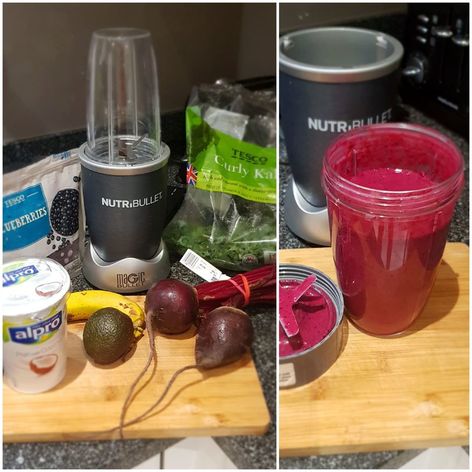
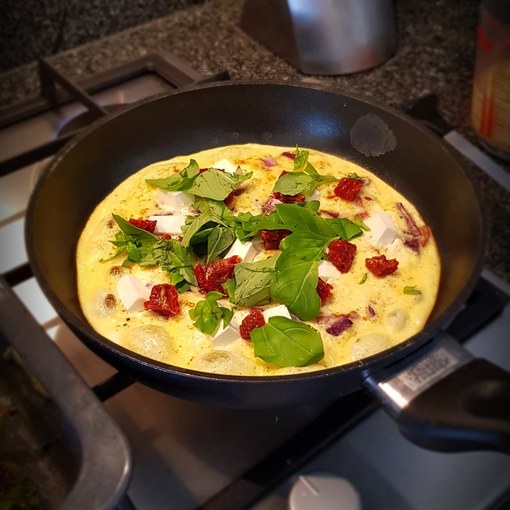
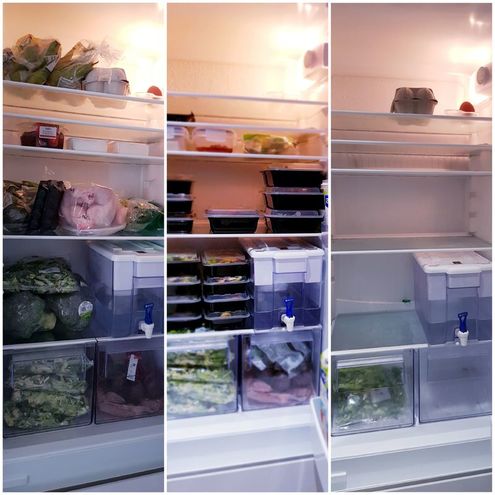
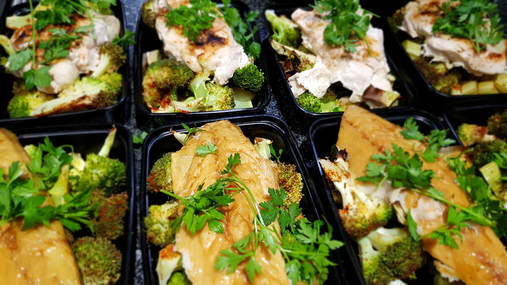
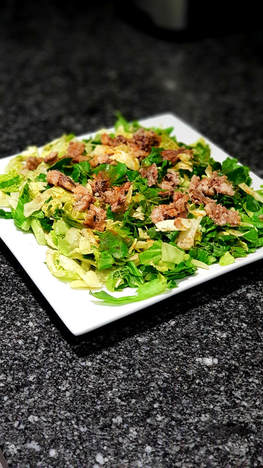
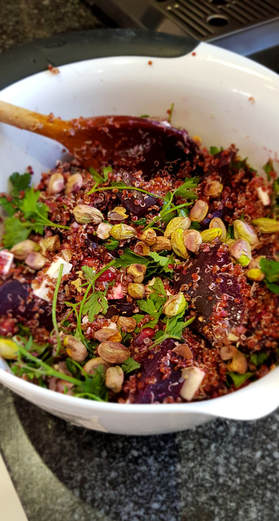
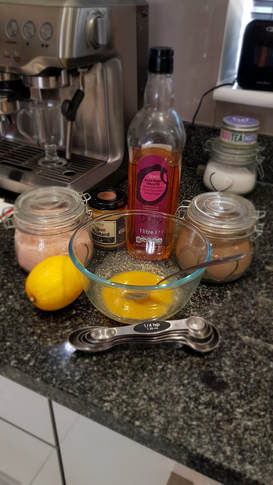
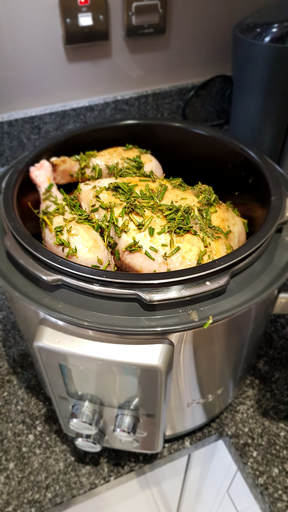
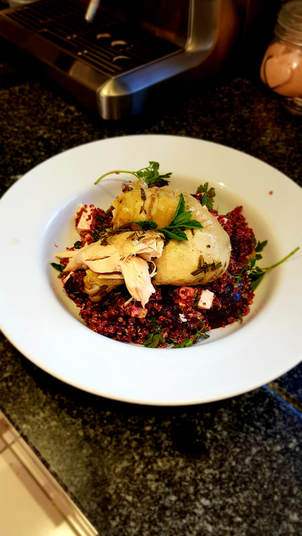
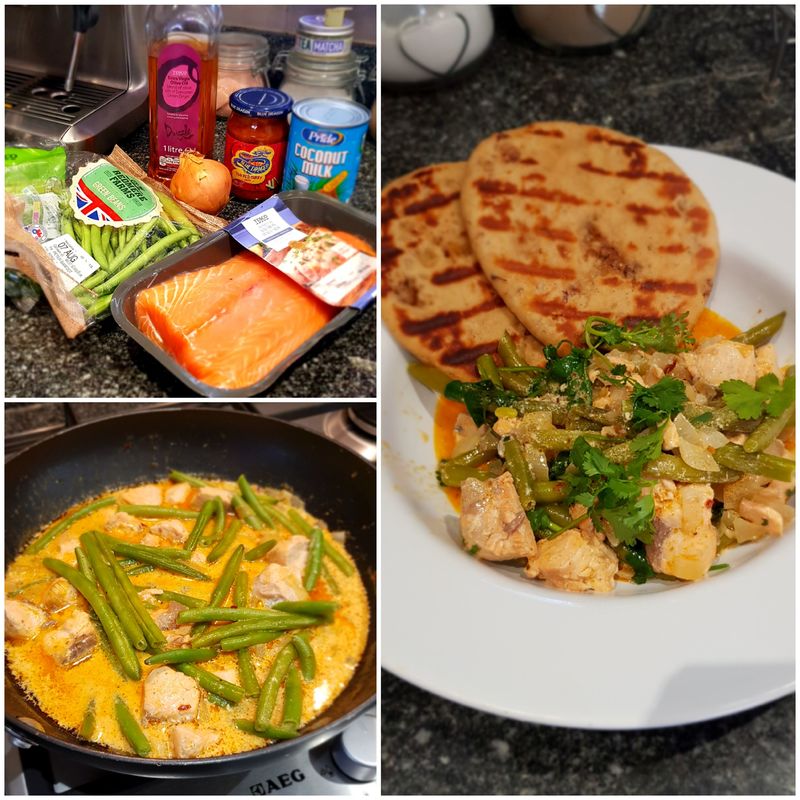
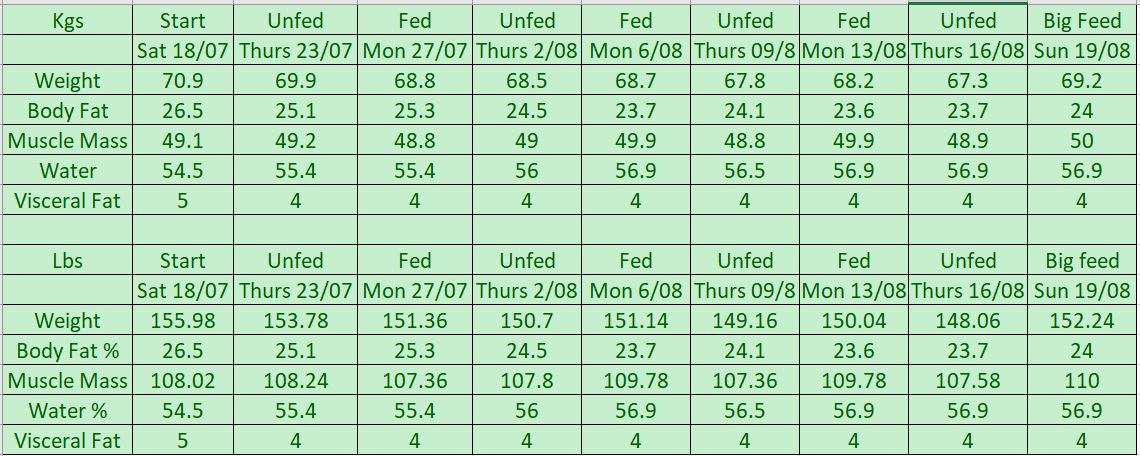
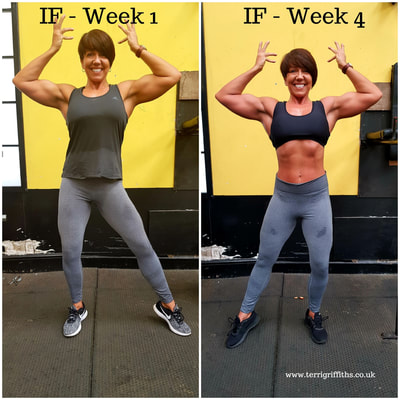
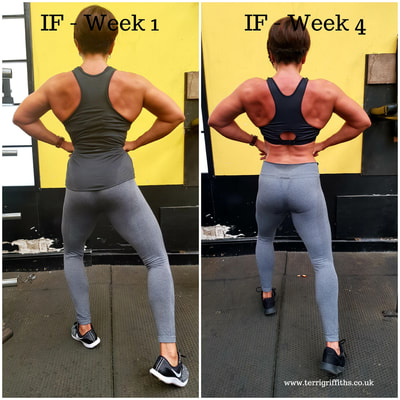
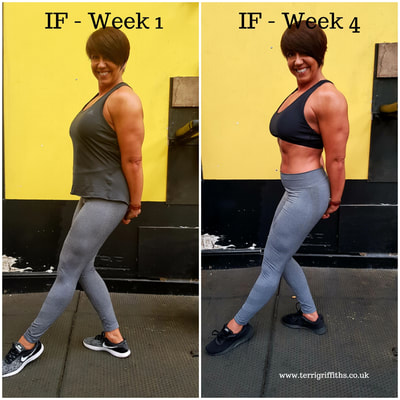
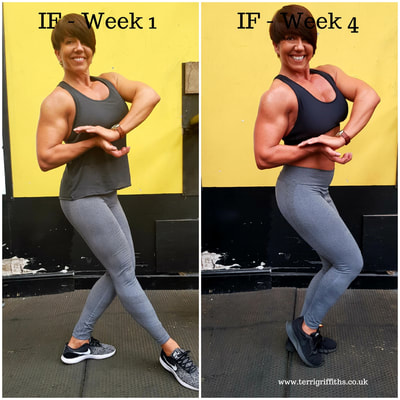
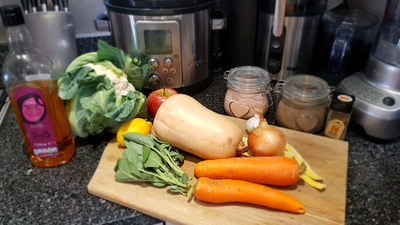
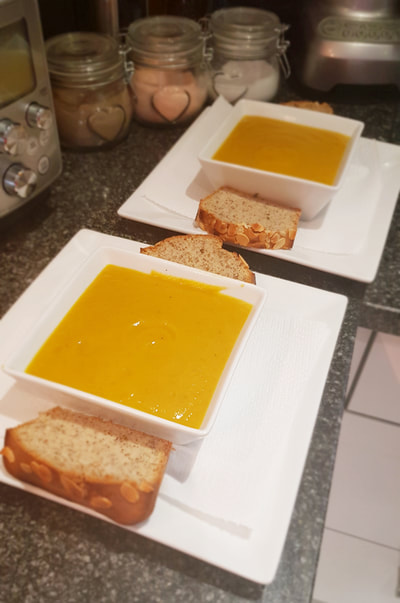
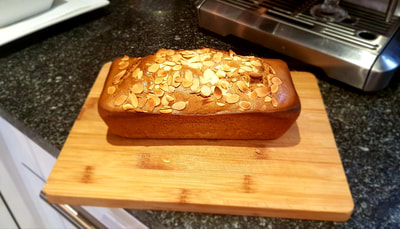
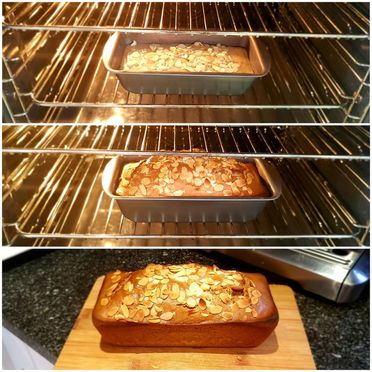
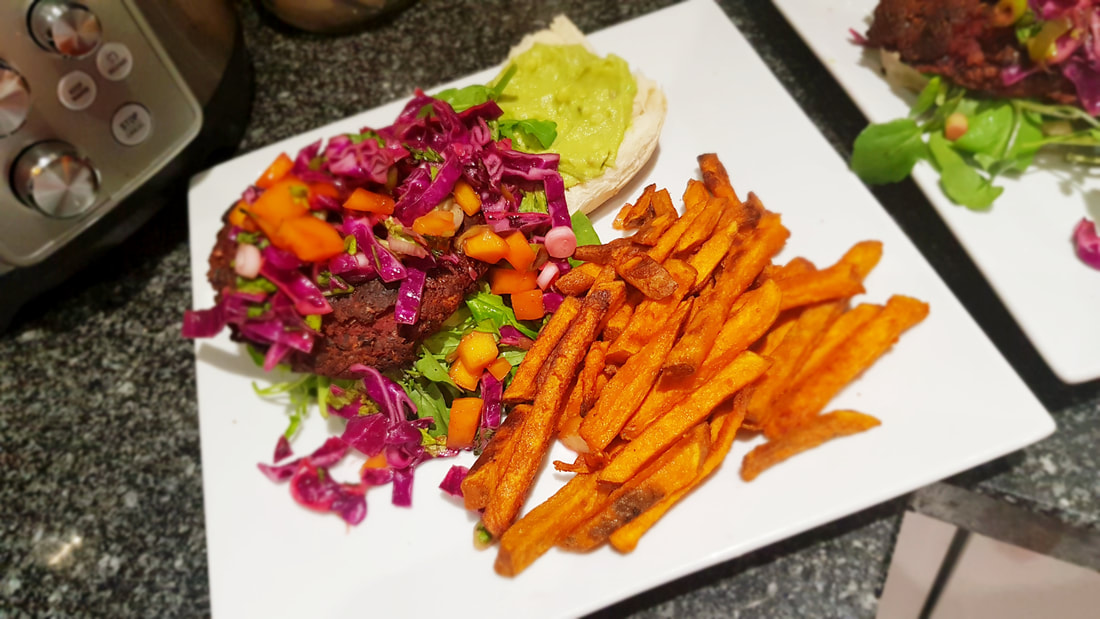
 RSS Feed
RSS Feed
